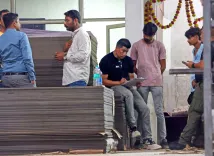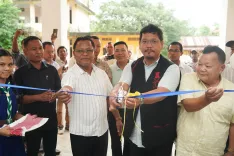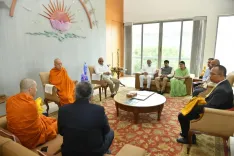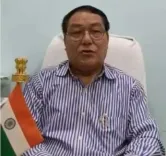Will Agricultural Scientists Spend 3 Days a Week in Farm Fields?
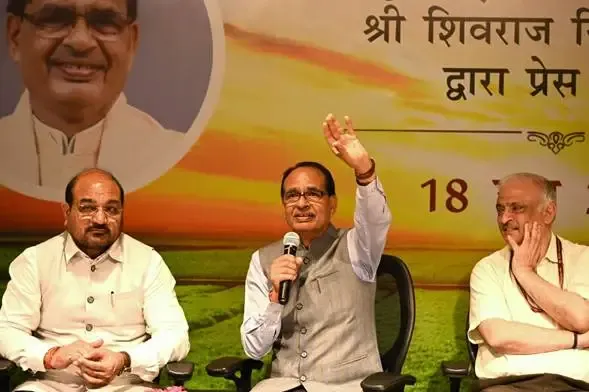
Synopsis
Key Takeaways
- KVKs designated as nodal agencies for farmer engagement.
- Scientists to spend 3 days a week in the field for direct interaction.
- State-specific Nodal Officers to address regional agricultural challenges.
- Strengthening of the Seed Act to ensure quality control.
- Focus on sustainable and profitable agriculture for farmers.
New Delhi, June 18 (NationPress) The Union Minister of Agriculture and Farmers’ Welfare, Shivraj Singh Chouhan, announced on Wednesday that the Viksit Krishi Sankalp Abhiyan has seen remarkable success nationwide and will continue as a dedicated effort to modernize Indian agriculture and boost farmers' prosperity via direct field engagement.
While speaking to the media, the Union Agriculture Minister outlined a range of immediate initiatives aimed at advancing agricultural growth and promoting farmer welfare.
Emphasizing the vital function of Krishi Vigyan Kendras (KVKs), the minister proclaimed that KVKs will be appointed as the leading agencies in each district. These centers will function as coordinated teams focused on meeting farmers’ demands. Furthermore, efforts will be made to standardize and enhance the KVK structure across the nation.
To ensure hands-on engagement with farming communities, KVK scientists are now required to spend a minimum of three days each week in the fields. Demonstrating his personal dedication, Chouhan mentioned that he will personally visit farms two days a week to connect with farmers directly and grasp their challenges.
Moreover, the Indian Council of Agricultural Research (ICAR) will designate a state-specific Nodal Officer for agriculture. This officer will oversee scientific trials, identify state-specific challenges, provide expert guidance, and maintain close ties with state governments. The goal is to ensure scientific findings and policy measures are customized to meet the distinct requirements of each region.
The Minister also pledged that he, along with senior officials, will regularly consult with state governments to synchronize strategies and provide agricultural solutions tailored to regional needs.
As part of the Viksit Krishi Sankalp Abhiyan initiative, 2,170 teams consisting of scientists, officials, and agricultural experts have visited over 142,000 villages, engaging directly with more than 134 million farmers. The initiative saw active involvement from Chief Ministers, Union Ministers, State Ministers, Members of Parliament, MLAs, and numerous grassroots representatives.
He stressed the importance of closing the existing gaps in knowledge, research, and institutional capabilities to deliver real benefits for farmers.
Chouhan identified low-quality seeds and pesticides as two urgent issues during the campaign. In response, the Ministry will implement stringent measures to reinforce the Seed Act and establish rigorous quality control protocols, ensuring that only certified, high-quality inputs reach farmers.
“This campaign was designed to bridge the divide between research laboratories and agricultural fields. While we have observed impressive progress, challenges remain. Our focus must now shift to enhancing productivity, lowering input costs, and ensuring agriculture becomes a profitable and sustainable livelihood for every farmer,” he asserted.
He commended the efforts of ICAR and the Ministry of Agriculture for the successful execution of the campaign and announced its relaunch during the rabi season.
Additionally, targeted follow-up actions will begin with a specific Action Plan for Soybean. A stakeholder consultation for soybean is scheduled for June 26 in Indore, followed by similar missions for cotton, sugarcane, pulses, and oilseeds, the Minister revealed.
A national-level meeting in hybrid mode is slated for June 24 at the Pusa Institute, where scientists, agricultural officers, and state agriculture ministers will review the campaign outcomes. Nodal officers will present comprehensive reports on agricultural conditions state-wise, laying the foundation for collaborative efforts between the Centre and states. The meeting will also delve into future research priorities and necessary structural reforms.
Chouhan noted that under the leadership of Prime Minister Narendra Modi, food grain production has surged by 40% in the past 11 years, a testament to consistent and strategic policy implementation.
“Our mission is to guarantee food security, nutritional availability, and profitable farming while safeguarding soil health for future generations. India must emerge as a global food basket,” he stated.
Chouhan outlined the vision of ‘One Nation – One Agriculture – One Team’, highlighting the necessity for an integrated platform where farmers, scientists, institutions, and policymakers collaborate to achieve the shared goal of advanced agriculture and farmer prosperity.

